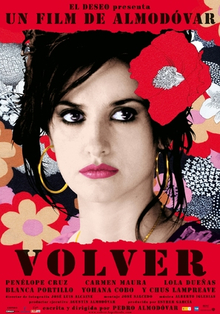We’ve watched several films by Pedro Almodóvar and quite a few of them star Penélope Cruz. This is another one of his films that really only has woman characters and every single man in the lives of these women are monsters. It’s darkly amusing and for a while there’s a bewildering sense of not knowing quite where the director might be going with this. This film is highly rated by critics but I don’t see the point of it at all and I find it ludicrous how lightheartedly it treats such weighty topics like sexual assault. I suspect that I’m missing something here.
Raimunda and Sole are sisters and together with Raimunda’s daughter Paula return to their home village to visit an elderly aunt. They worry about her living by herself as her eyesight and her memory are failing. A neighbor Agustina assures them that she is helping to take of her. The aunt herself seems to believe that the sisters’ mother, who died in a fire several years ago, is still alive. Shortly after they return to Madrid, Raimunda learns that her husband Paco has lost his job. One night she finds him dead, having being killed by Paula in self-defense after he tries to rape her. Raimunda hides his corpse in a restaurant being sold by its owner. When a film crew comes by, she decides to run the restaurant herself to serve them and make money. She is too busy with the restaurant and worrying about Paco’s corpse to go to the funeral when her aunt dies. Sole goes by herself and meets with Agustina. However when Sole returns home, she finds in her car her mother Irene, seemingly returned from the dead.
My wife says that the word volver means return in Spanish and it’s easy enough to understand what it’s referring to. There’s murder, rape and blatant attempts to cover up crimes but the film treats it as black humor. Indeed when Raimunda bustles about to hide Paco’s corpse, the director chooses to use the most stereotypical music possible seemingly as a gag. There are other weird elements too like Agustina appearing on a reality show to talk about her own mother and then changing her mind about it. On one level, it’s endlessly entertaining since you’re never quite sure what will happen next. But it’s also hard to discern any kind of broader message or theme beyond expressing frustration at how awful all men are and stating that women are better off without them. Of course, it’s also about daughters’ relationship with mothers and wanting to deal with the unresolved issues in life, but those kind of go without saying and I’m not this film has anything interesting to say there.
My best good faith interpretation of what Almodóvar was going for is that this is an homage to a specific style of filmmaking and is further grounded in the region of La Mancha in Spain that was his own place of birth. As such the superstition and attitude towards death and misfortune, the mocking dismissal of men being useless and unneeded, and even the mutual support networks among women shown here represent a very particular confluence of values. This is a culture that I’m not familiar with however so it’s not surprising that it doesn’t resonate with me. I found it entertaining enough but that’s all. I just can’t see it as being especially good.
